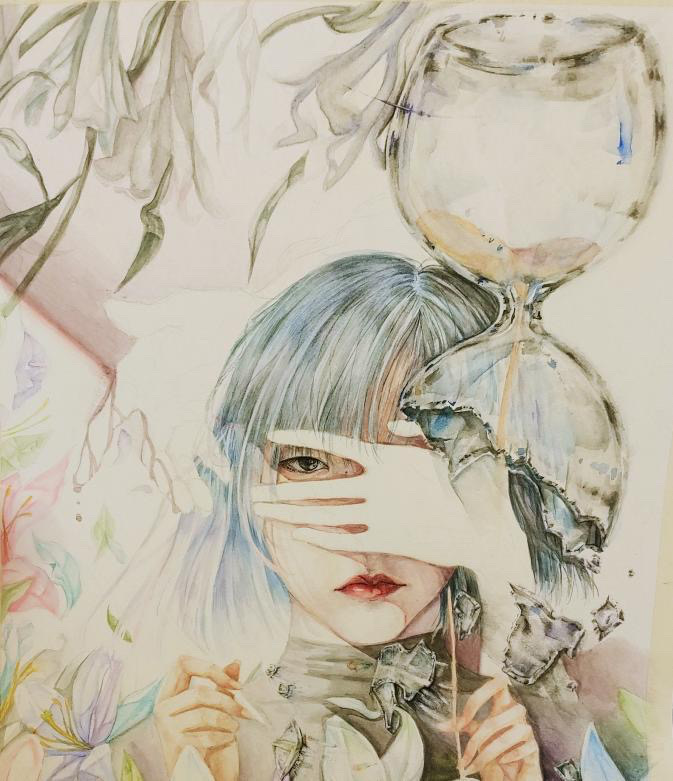Zooming into Individual Skills
As Brahmas settle into an online learning environment, many teachers have had to change the way they instruct their class. For most visual arts courses, teachers are now switching their focus to the individual skill of a student.
With two years of experience in Diamond Bar High School’s art classes, it was easy for senior Catherine Liu to adjust to AP Studio Art in an online environment. Liu said that the class has been working on their portfolios, for which they have already completed their first piece of artwork and are moving to the second.
“Comparing to my other classes, [AP Studio Art] hasn’t been as affected for me personally, especially because I’ve been doing this for a year already,” Liu said. “It’s not a cohesive class so I think it’s definitely not as impacted as some of the other classes are.”
Liu said that she and her peers have been working at a much quicker pace, considering the shorter class periods. During class, students critique their peer’s artwork in order to help other students improve their art throughout the school year. Sometimes, students do not even have time in the 40-minute class period to work on their assignments, nor do they always have time to finish their discussion of someone’s art before the period ends.
“In order to critique each other’s artworks, we’ll have to be looking at an online picture that we uploaded instead of pieces in person,” Liu said. “Critiquing is a little hard to see whether it’s the details or sometimes the angle may be a bit off if the person didn’t take the photo correctly.”
Senior Rex Hsu is taking Photography and Advanced Video Production, where he has had a strikingly different experience in each class. Both classes use Google Meets, but any semblance of similarity stops there.
Whereas he doesn’t think anything has changed in Photography, as teacher Bill Foley is still having students take pictures of specific objects, he’s noticed that his teacher for video production, Mario Enriquez, has started to lecture and emphasize individual skills, rather than group work, more than last year. This is his first year taking Photography and his second year in Video Production.
“Now [Mr. Enriquez] expects us to choose a skill we want to focus on, whether it be directing, or producing, screenwriting, or visual effects,” Hsu said. “Now he just gives us lectures the entire class and only gives us time after school to make the film.”
Although students would normally work together to complete a project for video production, they now have to complete screenwriting and production by themselves. Currently, students are working on making a showcase film that will highlight one skill they want to focus on.
“For me, I’m focusing on visual arts, and we all have to make the video ourselves so we can’t meet up with each other,” Hsu said.
DBHS has provided Hsu with a DSLR camera, which he uses for both Photography and AP Video Production, as well as LED lights and a tripod. As the year progresses, he predicts both Photography and Video Production will challenge his ability to stay focused on Photography’s new learning format, and keep up with the new expectation his video production teacher has for the class.
Maya Mehta, a junior, is taking Studio Art. Her teacher, Vianney Hwang, has limited the amount of work he expects from students, as he has them turn in one piece each week, rather than daily, for Inktober, a popular artistic challenge where artists create one ink drawing based on a prompt for every day of October.
“One drawing per day is a lot of time, so I think he understands that we are busy students,” Mehta said.
Mehta’s class is currently working on a project for the Korean-American Association, which is an organization that teaches the Korean language and culture to Korean-American Californians. The prompt students have to follow is the term ‘Korean’ and they will individually mail their drawings to the organization on Oct. 9.
Compared to in-person instruction, the online class is much more formal. In past years, Hwang used to play music for the class to listen to while they talked to each other, which Mehta said allowed her to make new friends.
“We’re just working on our own projects because we can’t chat with our friends like we used to, or ask personal questions to people so we can get to know each other a little bit more,” Mehta said.
Your donation will support the student journalists of Diamond Bar High School. Your contribution will allow us to purchase equipment and cover our annual website hosting costs.



